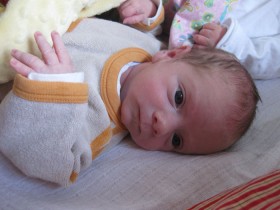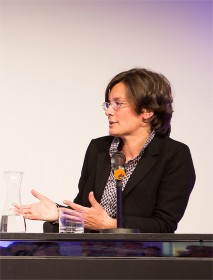
Circumsized or not, he is already practising … © private
Signe and Darrell have been together a long time. They met in the USA, have shared an apartment in Berlin for nearly 15 years, and now have two daughters and a son together. Signe’s family is Jewish American on the mother’s side, German Protestant on the father’s. Darrell is 100 % North American – in his family, you can find just about everything: Puritan pastors, Unitarian ministers, Mormons, Catholic liberation theologians, liberal Muslims, secular Jews. I talked with the two of them about circumcision and the role that Jewish tradition has played in raising their children.
You first had a daughter, then twins. One of the twins is a boy. Did you think a lot about the question of whether to circumcise your son while you were pregnant?
Signe: When I found out that one of the twins was going to be a boy, my first thought was → continue reading

Dr. Karen Körber, the first scholar ever to benefit from the Fellowship Program of the Jewish Museum Berlin © JMB, Photo: Ernst Fesseler
The Jewish community in Germany has undergone a profound change in recent years—and the protagonists behind that change are the primary focus of research undertaken by Dr. Karen Körber, the first scholar of the Fellowship Program of the Jewish Museum Berlin. For the last two years Dr. Körber has been investigating “Daily Realities: Jewish Life in Germany Today” and she recently spoke to me about her findings.
Karen, the Fellowship Program of the JMB supports research into Jewish history and culture as well as into broader-ranging aspects of migration and diversity in Germany. You are the first person ever to complete the two-year Fellowship Program—a pioneer, so to speak—and I’d be interested to hear about that experience.
I found myself in a very open situation and was able to do much as I liked. All fellowship programs are fundamentally privileged set-ups but this particular one has the advantage of being attached to a well-endowed institution of international renown. → continue reading

A wall full of questions at the exhibition “The whole truth” © Jewish Museum Berlin, photo: Thomas Valentin Harb
Just over a year ago the Jewish Museum’s special exhibition entitled “The whole truth… everything you always wanted to know about Jews” ended. The only remnants – aside from the animated discussions and empty display cases – were thousands of pink post-it notes, which we kept and read through painstakingly. In the upcoming months we want to respond to some of the questions, comments, and impressions that visitors left behind. Thus to the question above.
Orthodox women do not show their hair in public after their wedding. → continue reading


